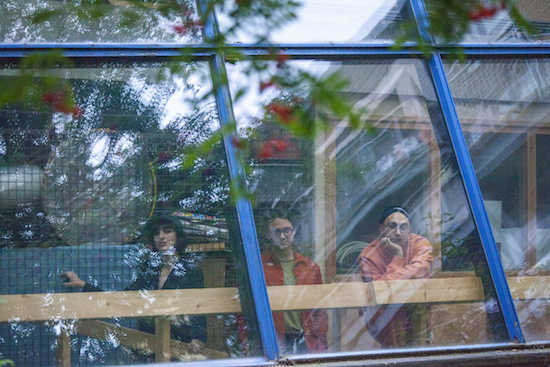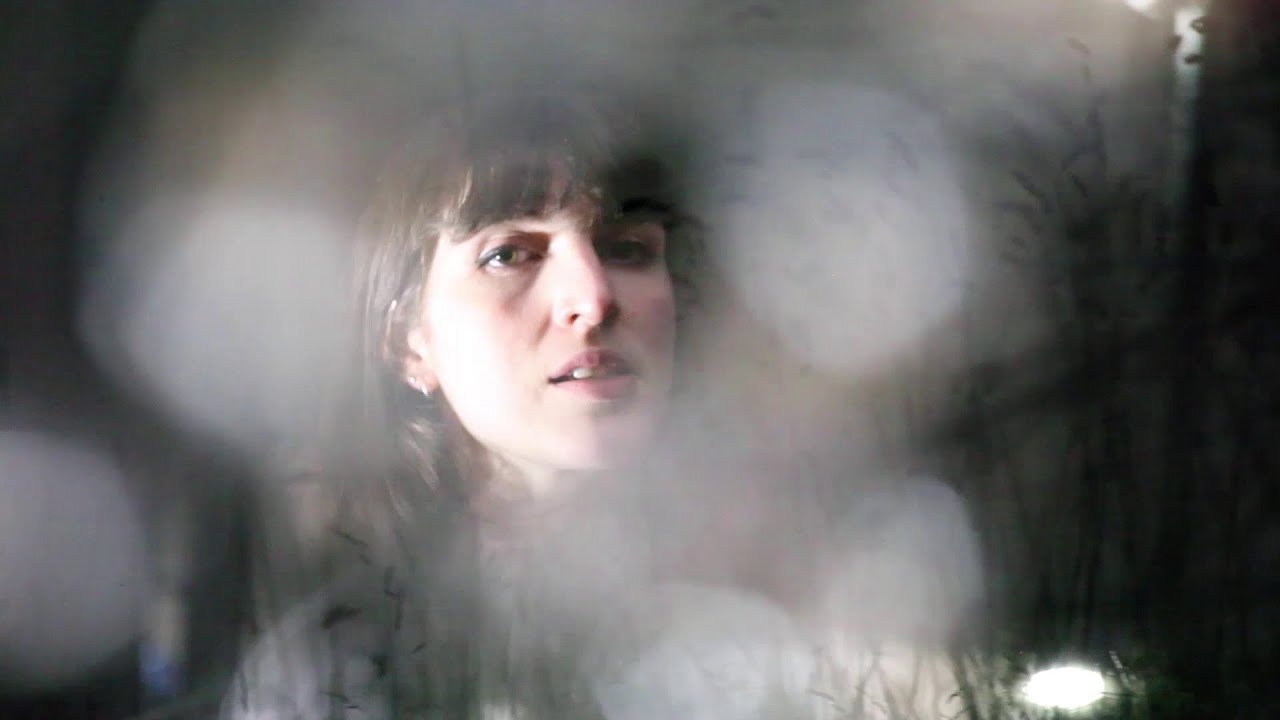"Well, you know what? I’ve been vaccinated," says Virginia Wing’s Alice Merida Richards. "Yeah, I got it done like last week. In the UK, they’re doing it for national treasures," she laughs.
At this point, who wants to hear about 2020, the year that won’t die? We’re all drained and depleted. Everyone is so, so tired. And yet, here we are, in 2021, awash with pressers for records recorded during lockdown, records inevitably about 2020, about trauma and healing. Still, the COVID-19 pandemic is the first thing I reflexively bring up and the first thing we talk about as Virginia Wing – the avant-pop trio of Richards, Sam Pillay, and Christopher Duffin – get settled into their practice space for the first time in quite a while. It’s the new small talk. Everyone can relate.
I don’t mean to suggest that those "2020 records" mentioned above are fundamentally cynical or opportunistic or less than genuine or shoehorned into a preordained press-release template, but very few have captured the feeling of living through 2020 in the way that Virginia Wing’s latest and best LP, private LIFE, does. Yeah, sure, the record ticks all the boxes: it was recorded during quarantine; it’s described by their label as candidly speaking about "hope, desperation, impulse, addiction, urge and shame". But it tackles it all in a beautifully holistic way, with brio and aplomb, reflecting its subject matter both musically and lyrically.
"If we had to say, ‘What’s your sound?’, it’s basically things falling apart in your life, and being confident in how shaky you’re being," says Pillay. "So, all the drums are falling apart and the synths and later there’s stupid stuff, but you’re doing it in a really confident way."
The tracks on private LIFE often feel like performers stumbling groggily on stage, elegantly shooting themselves in the foot, then somehow pirouetting off, perfectly choreographed, in unison. Unquantised drums knock under Richards’s warm sprechgesang, samples whistle and ping-pong throughout while Duffin’s sax honks along, sometimes bursting free, charting a course all its own. It’s paradoxically both chaotic and comforting, mirroring the way everyday life carries on during crises, wrestling just a little bit of order away from entropy.
Listening to private LIFE, it really feels like there’s this sense of hard-won of joy, and it has these moments that are quite funny. In ‘OBW Saints’, when the recording of ‘When The Saints Go Marching In’ pops up – that’s hilarious.
Christopher Duffin: I run a school orchestra. They’re all between five and eight, if that. And it was the first time I’d actually got them all to play together at the same time. I had gone through a real rough patch. And that was at the end of it. There’s actually a recording of it where I laugh at the end. And it was, if I dare say, quite cute. We included that because it just seemed really joyous, yet crap. It kind of represented how I was feeling really. You know, there’s a lot on this record that feels like putting on a brave face.
Alice Merida Richards: Yeah.
CD: And that represents that in a way, because that tune’s quite dark. And then it’s like, "Don’t worry, here’s some cartoon kids playing music!"
Sam Pillay: That tune, lyrically, is essentially about Chris and the rough patch. So, there’s that.
AMR: I would say the humour is pretty intentional. I think we’re all very silly. But also, it just mirrors your life. If you’re going through a hard time, not every part of your day is going to be crying – you’re going make jokes about it. And that’s exciting music – when it attempts to be funny, you know? It’s a cool thing.
CD: Also, for me, on the early Prince stuff, like Controversy or something, or like on the 1999 record, it was dead rude, with lyrics like, "I sincerely want to fuck the taste out of your mouth," and then…
SP: You might quote that too much.
CD: …but then, he goes into the Lord’s Prayer, and it’s like, "I’m really fucking rude, but I’m sorry! I’m sorry! I’m sorry! I’m really sorry!" And musically, because I go through periods of being like, "No, I’m so fucking serious. This is art. Fuck you. No, no, no." And then it’s almost like, "I’m sorry!" Because I’m daft as well. "Forget all that. Here’s a kid playing."
AMR: It’s like adding the "No worries if not!" at the bottom of an email.
I guess that leads into a major theme of the press release – of using art to work through things, as a sort of therapy.
SP: Well, I think it’s just our coping method every time. I think something that we’ve always been keen to get across is that we are all people who suffer. And we have different things going on.
So, yeah – fuck it – I’ll say it: I’ve had some weird health news. I have bladder cancer, probably. And it’s OK. Like, the first thing I’m thinking is just, "Well, what tunes am I going to do to help me through this time?" One of the things that we want to get across is that, as three people, the thing that we jump to, in order to feel better about situations, is just making things together. That’s the beginning and the end for us. Accolades are always nice, but it’s not about being "band people", it’s just about making stuff. It’s about the doing, rather than the end result.
AMR: With these people, I just want to make stuff. If we’re hanging out, we might as well be working on things, because it’s the most fun you can have. It’s not that it’s not hard, but it’s a welcome distraction a lot of the time. It’s somewhere to put stuff, you know? Somewhere to put it that’s easy and manageable.
CD: People throw themselves into things, don’t they? So, it’s not in a romantic way, like, "Oh, we have so much going on, I had to put it in a tune!" It just happens. We’re all musicians and it’s just about our daily routine and punching the bag, you know? You’ve got to keep at it rather than flexing online for six months and then quickly making a record. It’s just getting on with it. You’ve just got to keep working, haven’t you?
AMR: There’s nothing grandiose about music as a coping mechanism. For some people, it’s like cooking or whatever. It’s just something that they do ritualistically, and it’s just something to put your efforts into.
SP: It’s also something that you can be a lot more freeform with. This is why it works for us as a medium, I suppose. If cooking was your thing, to get wild with it, you’re going to end up eating way too much or making really disgusting foods. Music you can get wild with it and the end results – you can be a lot more subjective about a weird, potentially shit tune than you can about a disgusting meal.
AMR: I mean, what you’re saying reminds me of a quote from Chris’s old orchestra friends about music being the best drug. [laughs] Totally legal. A totally legal high.
SP: Without getting into it too much, I think it’s probably fair to say that Chris and I are pretty self-destructive people, aren’t we?
CD: Yeah.
SP: And I think that it’s a good thing that you can be destructive in music without fucking things up too much. Whereas if you’re destructive in the kitchen, you’re just going to make yourself sad, because it’ll taste terrible.
Was it a process to get to this point, to be able to work together in this way, to have that level of familiarity?
SP: Chris and I both have a solid adolescence of being in bands and fulfilling "that one guy’s" vision. Do you know what I mean? The lone Brian Wilson "genius", his vision where it’s like, you’re in some five-out-of-ten band with this guy – we stand in opposition to that. The moment that idea is completely out of your mind, the better. Because the problem with that is, when it was just Merida and I, that way of thinking – often it proliferates.
AMR: I think with the first and second record, there was a lot of having to get that out of your system and just push things a little bit. And for me, I had played in bands before, but it had always been punk bands with women. So, it was a different experience. Especially being "the front person". All of a sudden there was stuff to figure out. Like how I wanted to inhabit that role. It felt like there were certain things we needed to do to get to this point. But it’s just about gently pushing.
SP: Yeah, these things take time. To give you some context, I grew up in hardcore bands and stuff like that – where it’s just your mates and you just do it. You’re more concerned with creating a tune that is super fast and sounds like Bad Brains. That’s all you need to do. But when it came to things outside of that, which very much felt like "the other", I had no clue whatsoever. I didn’t know how to do it. And then I could only really learn from examples of, in the nicest possible way, incredibly arrogant young men. So, I was just like, "We have to project manage everything." And the thing is, I found it incredibly hard. So, I just thought, "Well, if I’m really serious about it, and if I have a vision of how this needs to be, maybe that will make up for the fact that I’m not very confident." The point is, now, without being arrogant, is that it’s second nature to all of us. And as a result, you stop taking yourself so seriously. And that’s basically it. That’s what’s changed – that we feel, in being chiller, in just relaxing and just doing our thing, we’ve legitimised ourselves.

Alice Merida Richards portrait by Martin Livesey
It seems like, inevitably, in a group where you have a female front person and guys in the band, there’s this assumption that, "Oh, well, here’s the voice…
AMR: And the puppet master!
…and here’s the person doing everything." And it’s this insidious, pervasive assumption that…
AMR: It’s like straight up, you see the boy and you’re just like, "So, that one does all of it, and that person doesn’t."
SP: That’s the assumption, definitely. Merida has always contributed to production as much as me. There’s never been a time in the band where I did all the music and Merida just did the vocals.
And that’s the thing. It seems like you almost have to train the press.
AMR: Yeah, once, Sam and I were interviewed by someone who then took out the fact that I was there and attributed all my answers to Sam. Insane!
CD: I find the whole thing really bizarre, because my growing up through music’s a little different in that I started playing when I was like five and I did all my grades. And I played in orchestras, big bands, and all that kind of stuff. And most of the time, I was the only guy. I was the only bloke in the jazz bands and stuff. And they were all incredible. So, when I was in my early 20s and started playing in bands, and it was all blokes and they were giving it the swagger and just playing an E and an A chord, it’s like, "What the fuck are you talking about? I’ve just been playing in this big band with this woman ripping through ‘Giant Steps’. You don’t know shit!" It’s mad.
AMR: Indie music in any way you want to categorise it – be it electronic, be it jangly guitar band – is meant to be countercultural, and yet it’s a culture of white man deciding shit!
All through 2020, you’d see stuff like, "This is the 2020 record." But it’s not a 2020 record, it was probably recorded in 2018. Sure, it relates, because pandemic aside, none of the things we dealt with in 2020, and are dealing with now, are new.
AMR: No, it’s not new. It’s not like everyone woke up January 1, 2020 and was like, "Oh, man, everything’s terrible." We knew it was bad. Like, it just got worse, right?
It was inevitable that if there’s any kind of massive disaster, it’s just going to exacerbate all these issues and just make everything way worse. So, we get a pandemic, and obviously, are totally unequipped to deal with it. But at the same time, you just keep living, and that’s what, to me, this record feels like.
AMR: It feels weird sometimes, doing super normal stuff, but in a time of intense turmoil. Sometimes, I catch myself for a second. Like, "Oh, right, my life’s internally mundane." You know? Everything’s mundane, except everything outside.
SP: At the same time, I’ve just got told I’ve maybe got cancer. And I was literally just like, honestly, I’m telling you now, "I don’t give a shit." You know what I mean? It’s just like, while I do give a shit, look at what’s happening! I don’t know, it just goes back to that arbitrary nature of everything. There’s not one definable way to process things. So, you just contribute – you just try and push forward your perspective on things, your tiny little perspective, as best as you can.
But I’ve got to say, yeah, 2020 definitely prepared me for whatever my situation is now, because it is just like, "Fuck it, man. It’s just life."
AMR: Like, your life is comprised of so many little things that you do ritualistically every day. And then maybe like one big thing will change one day and the other stuff carries on.
SP: It’s not even nihilism, it’s not about "Life doesn’t matter." It’s that life is arbitrary, and that’s what makes life beautiful. I guess if the record is a 2020 record, I suppose that’s kind of what we’re trying to say. There’s no grandiosity. We’re not trying to make a grand statement on the state of the world in 2020. That would be impossible. And for us to even enter into thinking that we are astute or eloquent enough to be able to talk for anyone other than the three of us, we’d be dickheads. So, it’s very much a 2020 record. But just in our way.
Following a surgical procedure last week, Sam Pillay’s physicians have informed him that they are 99% sure he is cancer free. private LIFE is out now on Fire




